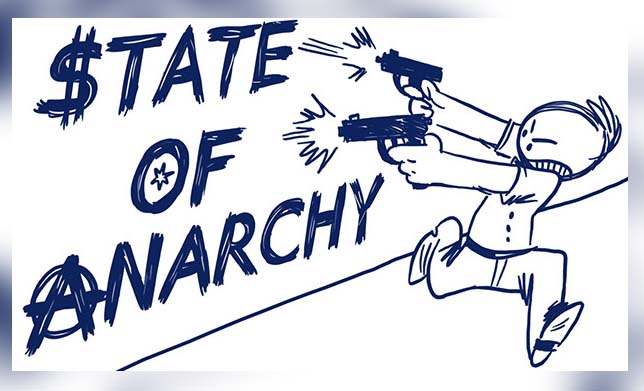In this age of democracy, nobody will ever doubt that the pen is mightier than the sword. Equally, when democratic values are in decline, the power of the pen too recedes to give way to the old jungle law of might is right. Quite ingeniously, this jungle law often is also conveniently sublimated in rustic logic as “everything is fair is love and war,” by war mongers of all hues. This epitome of profoundly illiterate logic, however can hold only where civilisational values have dimmed or have disappeared. Few could have said this better than Nobel Prize winning novelists, William Golding, in his classic, “Lord of the Flies”, and much before him, Polish-British writer Joseph Conrad in “Heart of Darkness”. Before everybody’s eyes, Manipur too has descended into this heart of darkness in the year that has gone by, and things are unlikely to be same again for a very long time, if at all. We do hope the state and its people will find the courage to strive to recover and climb out of the terrifying abyss into which they have plunged, so as to be see the refreshing daylight of democracy and civilisation again – if not immediately, at least in the near future.
For now, it is a truism that the obituary for democracy and democratic values are being written continuously, and more importantly, allowed being written by those who are supposed to be wielding the reins of state power. Under the circumstance, the terrifying shadow of the guns is lengthening and beginning to shape the minds and outlook of everybody, normalising a situation which in better times would have been considered outrightly abnormal. If it is not the fear of guns, then it is the lure of unearned money promoted by a culture of official corruption. The two together are today dismantling creativity and enterprise, freezing everybody and every institution into a silence akin to that of the graveyard.
This was somewhat always expected to be the culmination of the unprecedented conflict in the land and the reciprocal lack of accountability in politics. Somewhere in the dialectic between these two unholy agendas, all senses of morality have come to atrophy in spiralling rapidity. For slowly but surely, much of what were once considered to be archetypal sacrosanct spaces of our society are being encroached upon ruthlessly. Crimes which would have been considered unthinkable and unspeakable under any circumstance even a few decades ago, have ceased to be forbidden. Killing women and children, humiliating or even killing parents in front of children, attacks at hospitals and places of worship, unabashed gagging of the media, depriving it of its freedom to critically examine any development, be it that of the establishment or of its armed oppositions.
Equally sad is the fact that nobody even has tears left to cry for a lost world that once was dear to everybody. It must however be said reams and reams of newsprints have been spent lamenting these losses, but those who wield power, either that which flows out of the barrel of the gun or garnered with unaccounted money in elections, are not interested, or at least not moved.
The loss of these unwritten but intuitively understood sacrosanct norms, observed even in war, is especially bitter and ironic in the wake of the campaigns such as by the International Red Cross Society, IRCS, for standardisation of International Humanitarian Law, IHL. It may be recalled the IHL campaign reached Manipur some years ago. Even before the IRCS came into existence, these sacrosanct norms of humanitarian conduct were what distinguished the unique civilisation that took birth in our own soil. Many of the folklores and legends of this place tell of these same civilizational values. For instance, the Meitei’s treatise “Chainarol” which pieced together ancient combat laws which demand compliance to a common understanding of humanitarian behaviour is an invaluable evidence of this.
Somewhere down the line, concerns for these civilizational values ceased. There are some voices in the wilderness calling for the return of these values. Most notably this has been from the places great tradition of performing arts. Ratan Thiyam’s plays, “Blind Age” deals with the subject with artistic poignancy. An episode from the Mahabharata in which Ashwathama, driven by hatred and vengeance murders all offspring of the victorious Pandavas to ensure their bloodline meets an abrupt end, is given a new artistic rendering, depicting the tearing agony of a man with conscience, repenting his sin of having trespassed one of humanity’s sacrosanct spaces. The inevitable question that follows is, has the prolonged conflict situation and endemic corruption in public life in our society erased these same sacrosanct spaces, relapsing the place back into savagery?
The tragedy is, the liberal society seems to have no answer to this overwhelming question. The resort of even supposedly liberal establishments to extraordinary situations hence has often been to illiberal measures. Or else use the shield of these illiberal challenges to steep themselves freely into the addictive sin of Mammon worship. In very many ways, the reason behind draconian laws and endemic corruption is the bankruptcy of liberal minds to provide liberal answers to extraordinary problems. Had they been successful, the scripts of our present stories probably would have been a lot different. To underscore the point, opposing a draconian strategy on grounds of principle alone is simple. The difficulty is in presenting an alternative, appropriate, liberal strategy, and unless this difficulty is overcome, there cannot be much hope for any substantive change in this sorry predicament. This is the onerous challenge before liberal thinkers. The trouble also is, too many of our self-proclaimed philosophers are so given to fashioning armchair solutions first and then look for the problems. Perhaps it would be a worthwhile exercise to reverse this order sometimes.












